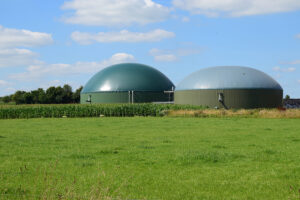“UK biomethane is valuable but too limited for widespread heating,” new report says

Commissioned by the MCS Foundation, the study reviews the latest evidence on biomethane’s potential role in a net zero energy system.
It concludes that while the gas could replace fossil methane in applications such as flexible power generation, high-temperature industrial processes and parts of the transport sector, there will never be enough supply to support widespread domestic or commercial heating.
“Biomethane is not going to be a ubiquitous green gas for every consumer,” the report said. “Instead, it should be prioritised for sectors that cannot easily electrify or adopt hydrogen or carbon capture.”
Forecasts for future biomethane production vary widely, from as little as 13 terawatt hours to as much as 120 TWh by 2050. Even the most optimistic figure would cover less than a fifth of the UK’s current methane demand, meaning overall gas use will need to fall sharply - by more than 80 per cent - to leave space for biomethane within a decarbonised system.
Feedstock availability is the main constraint. Sewage, food waste and farm manure can provide some supply, but large-scale expansion would require dedicated energy crops, an option that raises serious concerns about land use and carbon savings.
Sustainability is another sticking point. While UK rules require biomethane producers to keep lifecycle emissions below 86.4 kilograms of CO₂ equivalent per megawatt hour, some feedstocks perform worse than fossil gas if not carefully managed.
Regen’s analysis recommends reserving biomethane for high-value roles such as dispatchable electricity generation to balance renewables, high-heat industrial processes, long-distance shipping and aviation fuels, and small-scale agricultural or rural decarbonisation projects.
Grid injection could still be a cost-effective way of displacing fossil gas, but Regen warns against treating this as a reason to delay deeper transitions to electrification and other low-carbon options.
Policy remains a challenge. The Renewable Heat Incentive spurred biogas and biomethane growth during the 2010s, but the more recent Green Gas Support Scheme has delivered little new capacity.
Biogas production peaked in 2018 at more than 35 TWh before falling back and stabilising around 33 TWh in 2024, with only 8 TWh upgraded to biomethane for grid injection.
To stimulate further investment, Regen suggests replacing the support scheme with a contracts-for-difference model similar to that used for hydrogen, while embedding biomethane within national energy infrastructure planning.
It also urges government to set consistent carbon pricing across fuels and to develop a long-term plan for winding down the gas grid, recognising that biomethane can never fully substitute for fossil gas.
The findings align with previous analyses by the Climate Change Committee, the National Energy System Operator and the Green Gas Taskforce, all of which conclude that biomethane will be important but limited.
“Biomethane can make a real contribution to the UK’s net zero pathway,” Regen said. “But it is not a silver bullet. It needs to be carefully directed to the places where it adds the most value and where other options are not available.”


















